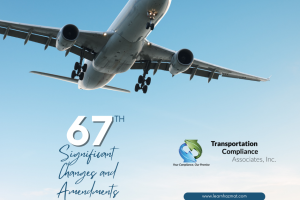New Rules for Transporting Lithium Batteries in 2016

Due to growing concerns over the stability and inherent dangers in transporting lithium batteries, there are new regulations that have been put in place to maintain the safety of the transporters and those handling the shipments. In late 2015 images of burning hover boards were plastered across news outlets, along with security footage of shipments contained in airline cargo holds of passenger jets also catching fire. Before these news reports, consumers were blissfully unaware of the dangers these power sources can have. But these batteries are categorized as dangerous goods. Now, amid growing concerns for public safety, new guidelines for storing and shipping lithium batteries have been put in place to help keep shipping company employees, transporters, and the public safe.
Changes for 2016
One of the biggest changes for transporting lithium batteries is a ban recommended by the ANC on transporting them via passenger aircraft that will take effect April 1, 2016. The International Civil Aviation Association has recommended these changes after 16 years of intensive research regarding Lithium Ion batteries. The ICAO (International Civil Aviation Organization) training strategies help keep everyone safe, from the airline employees that have direct contact with hazardous goods (like lithium batteries) to the passengers that may be seated above cargo holds carrying hazardous goods.
Not only are there direct shipments of lithium ion batteries, there are a number of goods that contain lithium ion batteries that are also shipped. These include small motorized vehicles that are battery powered such as the hover boards that are flooding the market to mini segways, airwheels, solowheels, and balance wheels. These are all powered with lithium ion batteries are normally shipped with batteries installed. While individually these vehicles represent minimal risks, when a unit is shipped, the risk is magnified and must be handled appropriately to ensure safety of shipping employees and the public and must be handled according to ICAO rules and regulations. Shippers must decide under which classification these goods are categorized.
Changes specifically include:
- Transport of lithium batteries is allowed on cargo planes only.
- Passengers are not allowed to have extra batteries in their luggage that is in the cargo hold, but may have extra batteries if they are in their original containers. If not, then they must be in separate plastic bags and their terminals must be taped to prevent accidental sparking.
- Passengers are allowed to carry on batteries that are in items such as cell phones, laptops and other battery powered equipment. However, the items must be turned off to prevent accidental sparking.
- Shipments of lithium ion batteries must be marked for cargo and contain all the required labeling for hazardous goods.
- Shippers may offer only one package of batteries for shipment in the overpack and they must be labeled accordingly.
- Packages must be presented separately from other cargo and cannot be loaded until after being inspected by the operator.
Safety First
The new guidelines are meant to reduce accidental fires caused by lithium batteries and to minimize any risks they can pose during shipments. Additional safety measures include shipments carrying batteries not over 30% SoC (state of change), but if they are over 30% SoC, approval and additional guidelines for shipping must be obtained by the state of origin and the state of the operator and must have specific written conditions under which transport will occur.
Addition rules for mobility devices mean that batteries for these devices be removed and carried in the cabin with the passenger. These new rules are meant to keep everyone safe and to ensure that batteries are handled with care.
Keeping compliant with consistently changing rules and regulations can be quite the task. Transportation Compliance Associates, Inc. know this and that is why they put all their effort towards making sure your employees are always properly trained and updated on any regulation changes in the industry. Take all the worry out of hazmat transportation with Transportation Compliance Associates, Inc. Call 412-249-1111 and schedule your first training session today.
Tag:ICAO




